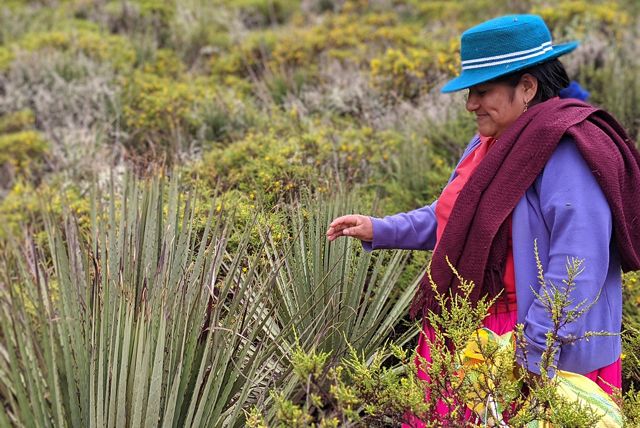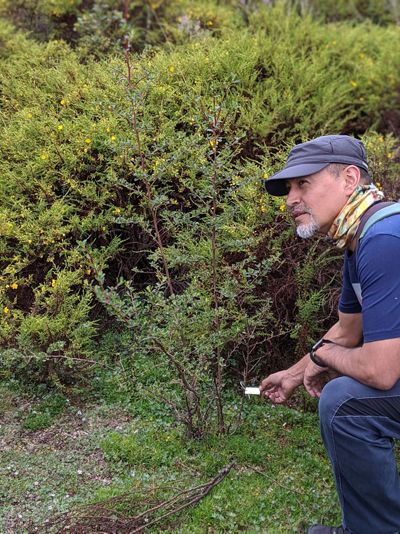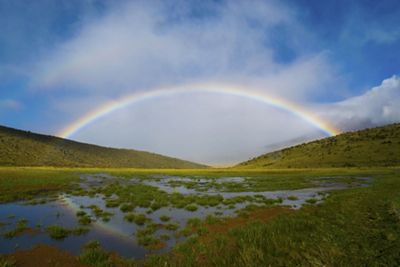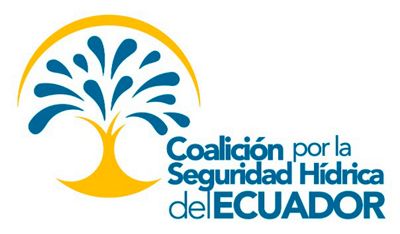Protecting Ecuador’s Water through Watershed Management
Water Security in the region has been one of TNC's main priorities for over 20 years
Water security shows increasing challenges in several parts of the world, and Ecuador is no exception. TNC works in conservation projects that improve watershed management decision-making to reduce water security risks. Ecuador's natural resources are its biggest asset and main ally.
Our work has led to the development of innovative solutions to contribute to water security by effectively protecting and monitoring rivers in Ecuador. Success has been achieved by the creation of three Water Funds:
- FONAG (Quito Water Fund, Guayllabamba river basin)
- FONDAGUA (Guayaquil Water Fund, Daule river basin)
- FONAPA (Paute river basin)
Additionally, we are strategic partners of the Tungurahua Water Fund (Tungurahua region). We understand that this model is replicable, adaptable to global contexts interested in investing in water. Water Funds become key stakeholders with local information and links, as they know the areas and build direct relationships with beneficiaries and landowners. Their efforts are instrumental to achieve clean water in Ecuador.


Reaching water security through watershed management
Water Funds were created with the objective to guarantee water quantity and quality for nature, human and productive activities. With this in mind, TNC has actively supported Water Funds in monitoring, fundraising and other vital efforts during their consolidation and operation.
Water funds have successfully implemented several conservation agreements with owners that take an active part in the decision-making of watersheds, impacting positively on this vital resource provided to Ecuador's main cities.
The success of the Water Fund model, created in Ecuador 20 years ago, has shown related problems that threaten water security in the country. Although there are challenges to address the loss of biodiversity and natural areas, challenges go beyond water source protection. TNC Ecuador works on contributing to a broader and more hollistic approach.
Ecuador's experience started a movement that has seen 26 Water Funds in Latin America, validating a successful model of watershed protection. In Ecuador, as well, all Water Funds operate independently.
Solutions at scale


Water security beyond the water source: water quality and human health
Through years of research, TNC Ecuador concluded that water security required a systemic approach in order to mitigate risks from climate change. Watershed management as an integral decision-making process that links all stakeholders on several levels has appeared as a long-term solution for this.
During 2020, TNC Ecuador led a strategic initiative to improve water security on a national scale. Ecuador's Water Security Coalition takes 23 nation-wide private, academic and civil stakeholders and puts them together to contribute in public policy, science and conservation development, corporate best practices and communication to help with system transformation towards better water management. TNC, Unicef and UDLA lead the SARCC table (sanitation, wastewater and climate change) to raise awareness on the direct link of human health and water security.
Private sector and government institutions must work on this issue, but other sectors, such as conservation, must contribute to solve these challenges. TNC has taken a broader framework, that includes not only conservation, but also strategic alliances with other sectors that were distant from environmental work in the past.

Our success in Ecuador
The environmental cost of water insecurity
The direct relationship between waste water treatment, human health and biodiversity conservation is now evident: the use of low quality water has specific impacts on diarrhea and first infancy chronic malnutrition.
Water security risks are very complex problems that require collective solutions. For example, waste water treatment and sanitation has a very high environmental cost. Leaving waste water untreated means significant polluting loads on rivers. Consequently, focus has shifted to the high environmental costs related to health, economy and social equity.

Everything that leaves the cities and towns ends up on rivers. TNC understands now that joint efforts must be leveraged with the health sector, as leaving waste water without treatment has deep impacts on human health, especially on rural communities. Freshwater and terrestrial biodiversity loss linked to this challenge is very significant.
This new way to look at a problem is part of the innovative approach the TNC Ecuador team has proved successful in the past and is now working on to preserve one of the most megadiverse countries in the world. Leveraging Nature-Based Solutions (NBS) to improve integral watershed management is now one of the main priorities that has shown already promising results on waste water management for rural communities.
Help us turn Ecuador into a solutions incubator
Sign up to receive regular updates from The Nature Conservancy.

The starting point to restore the planet’s health
From the top of the Andes, to the depths of the Pacific, from Galapagos Islands to the Amazon, we aim to turn Ecuador into an incubator for global solutions that enable nature and people to thrive together.



